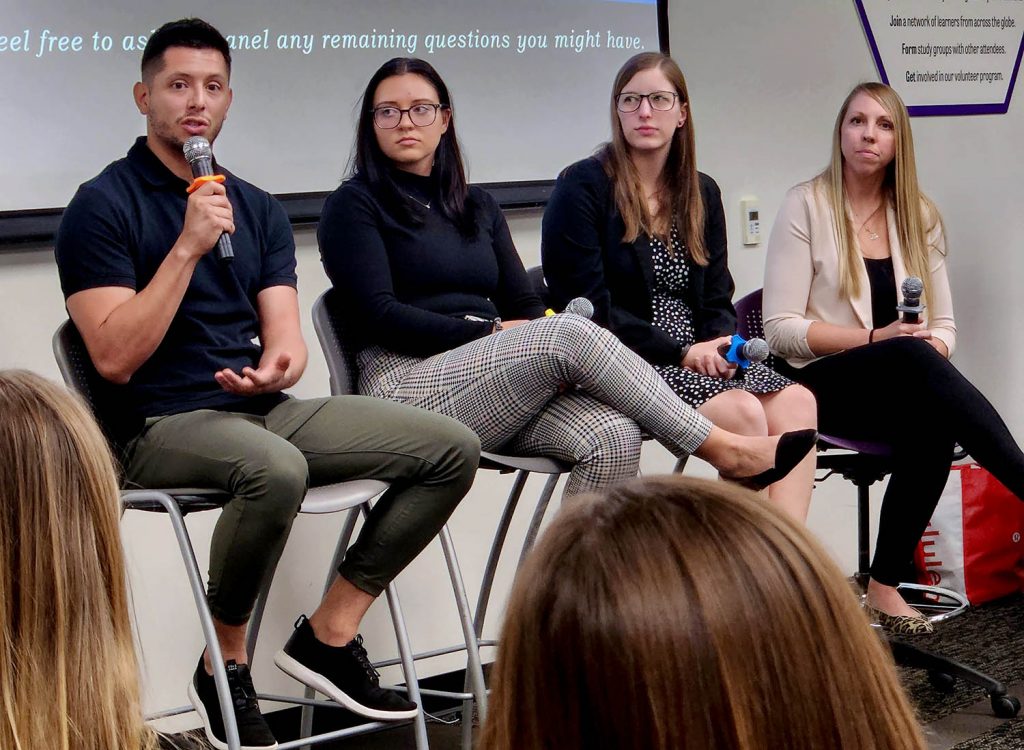
Watch the recording of the talk
Lauren Kemmer remembers the email in 2020 from the district superintendent that updated employees on the novel coronavirus somewhere far away in the world.
A few weeks later, schools districts everywhere closed, including hers.
“But our cafeterias never did close,” said Kemmer, who worked in school nutrition.
During the pandemic, her school nutrition department served more than 30,000 free meals to anyone up to 18 years old.
Being a dietitian really is a servant's job. ... It is a great helping profession because so much of our job comes with that individual counseling and growing relationships with people you're working with.
Emily Orvos, GCU Registered Dietitian
“God bless school districts because we were still open, and we were still serving kids, so amen to that,” said Kemmer, now the Manager of Sustainable Nutrition for the Dairy Council of Arizona.
She was one of a panel of registered dietitians who spoke to Grand Canyon University students recently in the Cyber Center of Excellence as part of the Science Dean’s Speaker Series, organized with the help of Strategic Employer Initiatives and Internships. They spoke to students interested in nutrition about pathways and areas of work within the nutrition and dietetics field.
“Being a dietitian really is a servant’s job,” panelist and GCU registered dietitian Emily Orvos said. “It is a great helping profession because so much of our job comes with that individual counseling and growing relationships with people you’re working with.”
During her time in competitive figure skating, Orvos became interested in how nutrition would benefit her athletic performance.
“Once I saw those benefits, I really wanted to help other athletes and other active individuals,” she said.
It was the same for fellow panelist Steven Ortiz, a registered dietitian for Pinal County Women, Infants and Children.
Ortiz wrestled competitively for 12 years.
As a weight-restricted athlete, “I think I did everything wrong that I could have possibly done,” he said. “I would work out three to four times, not eat, limit my water intake, take supplements. There was never a clear understanding of what I needed to do to improve my performance. I’d be on the mat. Literally, my body would feel like it was full of lead. I couldn’t move. I was like, I don’t know what I’m doing wrong.
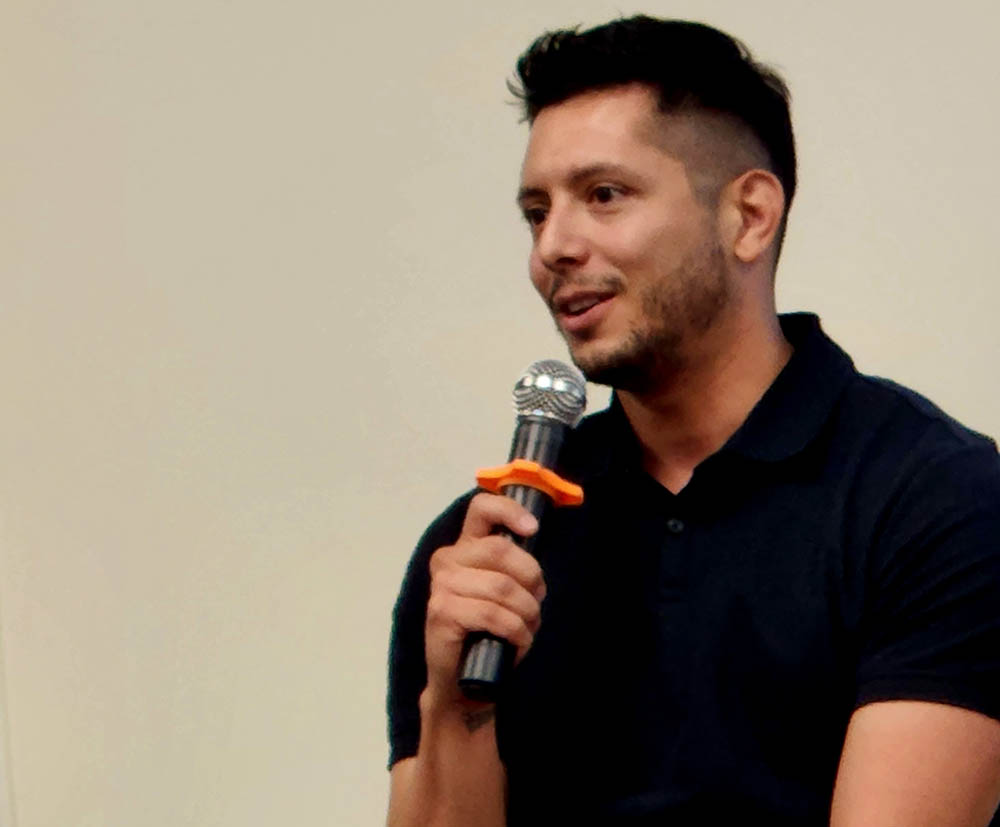
“What inspired me to go into nutrition was to have a better understanding of why I was feeling this way.”
If the panelists encouraged one thing, it was for students to NOT stop at that bachelor of nutrition degree: “Just get the RD,” said Kemmer of becoming a registered dietitian, which will become even more challenging since sitting for the RD exam will require a graduate degree starting Jan. 1, 2024. “It will open so many doors — so many opportunities for you.”
“You’re so much more limited in what you can do and what you can say and what you can help people with” without that designation, Orvos said of RDs. “If you really can picture yourself being someone who talks about nutrition, educates people about nutrition, about food, for the majority of your job, then I really would commit to going the RD route.”
For Orvos, the route wasn’t easy: “I didn’t get into my program the first time I applied, and I had to wait a whole other year to apply again.”
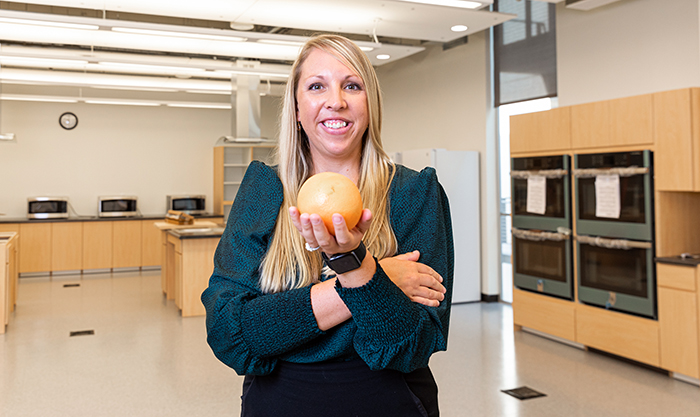
It was an obstacle echoed by Courtney Baker, Director of Nutrition and Dietetics at GCU, who moderated the talk. She also did not get into her program on her first try: “The good news is there’s a lot of different pathways available now that weren’t available back in the day.”
Even among the panelists, all three found their way to becoming a registered dietitian in different ways.
Orvos completed an accelerated coordinated master’s program at the University of Missouri, which resulted in both a bachelor’s and master’s degree. Ortiz followed a traditional route, earning his bachelor’s, followed by a dietetic internship and then his master’s. And Kemmer went nontraditional, earning her bachelor’s and then following an Individual Supervised Practice Pathway so she could sit for the RD exam.
Another obstacle panelists shared was organic chemistry. Be prepared to take a lot of science and know the Krebs cycle by heart, they said. Also, be proactive in finding mentors and gaining experience.
“In sports nutrition, you have to be pretty self-directed as far as finding different ways to gain experience,” said Orvos, who sought out and completed internships with the University of Missouri athletic department and with the Kansas City Royals, who conduct spring training in Surprise, Arizona.
Ortiz said he didn’t know anyone who knew about dietetics before he found a dietitian in his hometown. The dietitian mentored him, advising him to take classes at Central Arizona College and try to find a nutrition-related position.
Panelists encouraged students to volunteer at the local food bank, community garden or in school nutrition — anywhere there’s food.
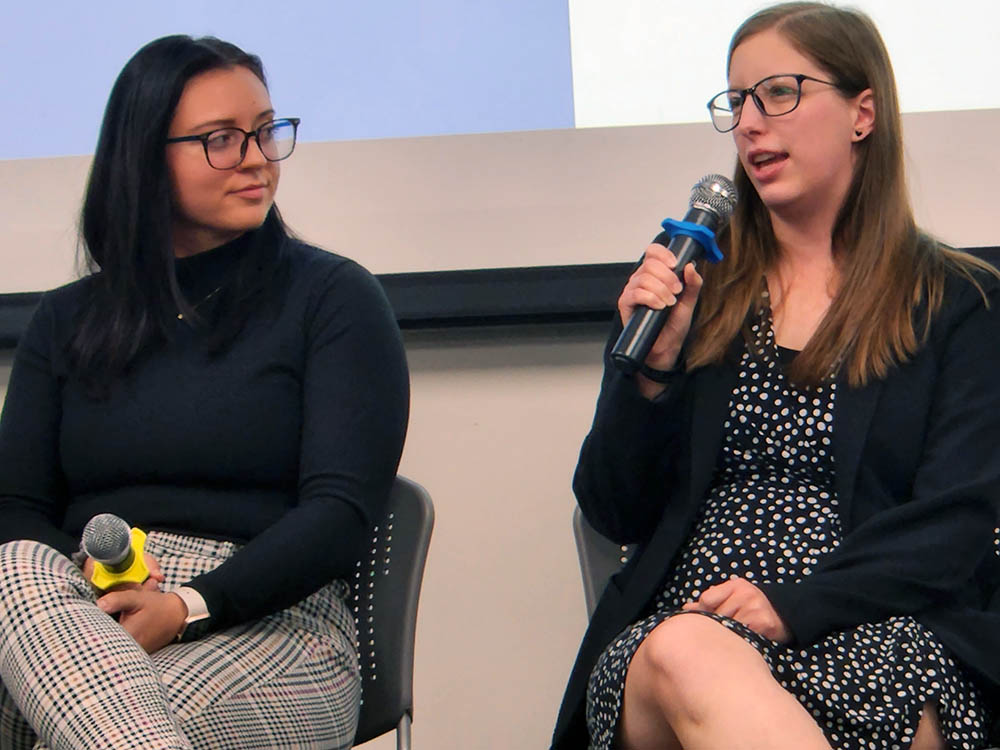
Another obstacle? The registered dietitian exam: “The RD exam is hard; I’m not gonna lie,” Kemmer said.
Her advice: To keep the information fresh, don’t wait more than a month after an internship to take the exam, and she pointed to resources such as the Visual Veggies software and Inman study guide.
The panelists also spoke about their love of nutrition, their jobs and how excited they are for the future.
Kemmer wanted to go into nutrition because food binds us, “whether that’s culture, whether that’s religion, whether that’s creating memories as a family. … You want to help other people lead healthier lives.”
That sense of community still motivates her in her job at the Dairy Council.
She read about dairy farmers in another state bringing a calf into a classroom. She wondered if she could do that here.
“Is there such a thing as dairy farms in Arizona?” she wondered. There were, and her school organized several calf visits.
“That was a great experience. … Cows are just the best,” she said excitedly as she expressed another aspect of her job she loves, which is “highlighting that farm-to-table story with local food.”
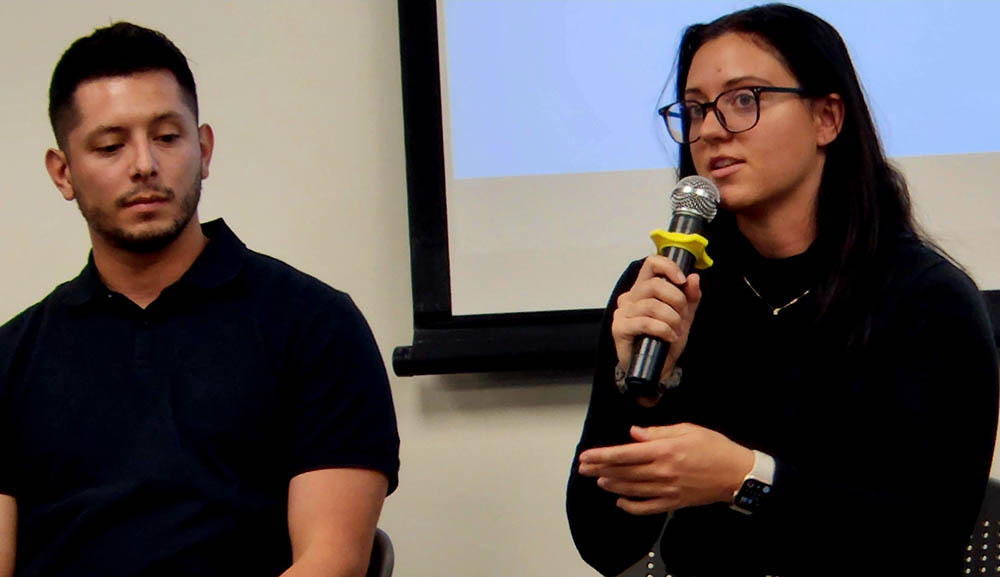
As GCU’s registered dietitian, Orvos said what she loves is “I get to share with young women, especially young people in general, things I wish I would have heard when I was young — when I was a competitive athlete. ... It’s OK to eat. We don’t want to be scared of food. Food is there to help us.”
Ortiz said although he wanted to go into sports nutrition, “Honestly, I think I found my real passion being in maternity and child health and community nutrition.”
He added, “I think it’s a very exciting time for nutrition … especially on the community nutrition side.” The pandemic, he said, brought to the forefront the importance of community health and that RDs are a valuable part of health care teams.
Senior nutritional science major Olivia Tynes, who attended the panel, said, “It is great to be able have a space where we can get connected with professionals and learn more about getting our careers started. Being able to talk with each of the panelists individually and hearing their own experiences provided a lot of new insight.”
The panelists added that while other health care professionals are aware of nutrition, registered dietitians truly are the experts.
“RDs are really being recognized for the value that they’re bringing to the table,” Ortiz said.
GCU senior writer Lana Sweeten-Shults can be reached at [email protected] or at 602-639-7901.
****
Related content:



































































